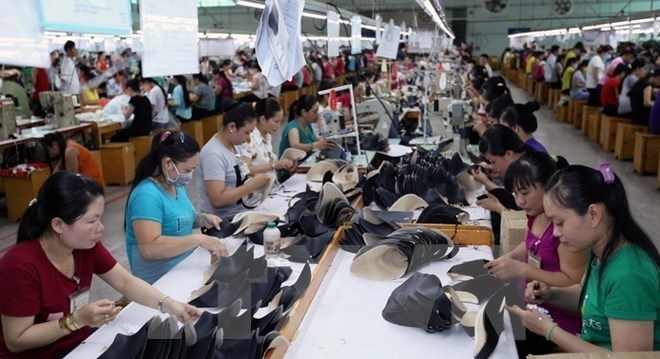
According to the Vietnam Leather, Footwear and Handbag Association (Lefaso), the country’s leather industry is enjoying good chances to benefit from the shift of orders from China as a result of the tendency of moving to the production of high-tech goods.

Illustrative image (Photo: VNA)
Industry sources also said the signing of a number of trade
agreements like the Vietnam
– EU Free Trade Agreement (EVFTA) and the Comprehensive and Progressive
Agreement for Trans-Pacific Partnership (CPTPP) is ushering in chances of
development for Vietnam,
especially in attracting investment and boosting export to the markets in the
EU and CPTPP members.
Lefaso president Nguyen Duc Thuan
affirmed that export activities of Vietnam’s leather industry are
seeing a stable growth with positive signs for the second half of this year and
the years to come. The forecast for the world economy in 2018 is rosy, that is
why the demand in Vietnam’s
major export markets like the US,
the EU, China, Japan and the Republic of Korea
will be better than that in 2017.
China is believed to continue the policy of
reducing investment incentives in the industries of garment and leather to
focus on high-tech ones, and orders for footwear and handbags is expected to
keep moving from China to Vietnam in
anticipation of chances created by those FTAs. However, Vietnam’s
leather industry is now facing numerous difficulties like rising labor costs
and low productivity compared to other countries in the region. Especially, the
Fourth Industrial Revolution will also cause impact on the enterprises in the
industry as they will head to investing in modern machinery and reducing work
hands.
The leather industry’s production is
planned to turn out about 279 million pairs of footwear in this year, with 72
million pairs in the third quarter and 80 million pairs in the last.
The first half of this year continued to witness
a growth in the production by the industry, with 127.4 million pairs produced,
an increase of 5.1% year-on-year. They brought back US$9.45 billion to the
country, rising by 8.4% compared to the same period last year. The export
revenue of this kind of product is forecast to reach US$19.5 billion, or 10%
higher than the figure recorded in 2017.
Source: NDO
Dao Village’s honey – a product certified with a 3-star OCOP (One Commune One Product) rating by Thong Nhat Agricultural Cooperative in Dao Village (Hoa Binh City) – is highly regarded by consumers for its quality, richness, and variety in packaging. The distinctively sweet taste of Dao Village’s honey leaves a lasting impression on anyone who has tried it.
In alignment with Project No. 07-DA/TU, issued by the Hoa Binh provincial Party Committee on November 1, 2021, Lac Thuy district has actively promoted investment and supported the sustainable development of its industrial and handicraft sectors during the 2021–2025 period. Alongside this, the district has remained committed to preserving and revitalising traditional craft villages.
Located in the northern part of Lac Thuy district, with a temperate climate and fertile soil, Phu Thanh commune has great potential and advantages in growing tea. The long-standing experience, combined with strict adherence to organic farming practices in the tea gardens, ensures that the dried tea products from Phu Thanh and Lac Thuy as a whole are sold out immediately upon production, providing a stable and prosperous life for the local people.
Amid efforts to streamline the administrative apparatus, Hoa Binh province has intensified measures to address challenges in land clearance, resettlement support, and infrastructure investment, aiming to speed up the progress of key projects.
Hoa Binh province has posted an unprecedented economic growth rate of 12.76% in the first quarter of 2025, marking its highest quarterly performance to date and positioning it as the second fastest-growing locality in the country, trailing only Bac Giang province.
Under current regulations, products in the One Commune – One Product (OCOP) programme that are rated three stars or higher must undergo re-evaluation every three months. However, in reality, some of these products fail to consistently meet the required standards, raising concerns about the sustainability of their OCOP certification. This underscores the urgent need for producers to enhance product quality and gradually develop their OCOP products into strong, marketable brands.



